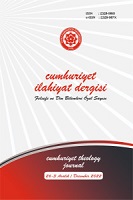Molla Sadra ve Nefis Konusunda Pre-Sokratikleri Savunusu
Mulla Sadra and His Defense of the Ancients on the Soul
Author(s): Sümeyye ParıldarSubject(s): Cultural history, Philosophy of Religion, History of Psychology, History of Islam, Psychology of Religion
Published by: Cumhuriyet Üniversitesi İlahyat Fakültesi
Keywords: Mulla Sadra; Medieval and Ancient Theories of Psychology; Receptions of Ancient theories of soul in medieval Islam;
Summary/Abstract: Mulla Sadrā refers to ancient Greek philosophers in his writings quite often, especially when the subject matter is the soul. In this article, I will address how Mulla Sadra reiterates Avicenna’s summary and analyses of ancient theories of the soul as discussed in Safar 4, Bab 5, and Fasl 5 of, al-Hikmat al-Mutaʿāliya fi asfār al-ʿaqliyyat al-arbaʿa. The source of these discussions, when the structure and basic contents are considered, is Aristotle’s De Anima Book I. Before defining the soul, Aristotle discusses what kind of a science, a science on the soul should be, and afterwards, he evaluates previous theories on the soul as those defining the soul through movement, perception, and life. We observe that this evaluation on previous theories play a preparatory role for his own definition of the soul as perfection and actualization. In a similar manner, in Safar 4, Bab 5, and Fasl 5 of Asfār al-aqliyyat al-arbaʿa, Mulla Sadrā reinterprets and discusses Ancient theories in such a way that the discussion leads us to a theory similar to Mulla Sadrā’s. In the presentation of this chapter, we find out that the soul is immaterial and modulated (tashkīkī) reality and is represented as a unity which is in a constant movement in its substance. The soul is matter in its origin, yet turns into an immaterial reality through substantial movement. In direct disagreement with Aristotelian philosophy, for Mulla Sadrā, movement in substance is possible as well as it is essential in understanding the reality of the soul. When Mulla Sadrā evaluates the ancient discussions and the criticisms by Avicenna, he finds that the discussion focuses on the source of mobility yet the soul is supposed to be defined as the source of immobility equally. Next in the discussion on movement, he focuses on the necessity of accepting the principle of substantial movement. According to Mulla Sadrā, Avicenna (following Aristotle’s presentation and interpretation) is misleading in his evaluation and criticisms of the ancient theories on the soul mainly because he follows a literalist reading. On the contrary, sources for Ancients’ knowledge is perennial wisdom, and their words on the soul have deeper meanings than what is understood at the first reading. When read with more trustful lenses, it will be manifested that the soul is an immaterial reality for them as well. For example, when they talk about the soul as a sphere, Mulla Sadrā thinks that they want to direct attention to the perfection. When fire is mentioned, the dynamic reality of the soul is brought to light. Mulla Sadrā, adds the principle of gradation (tashkīk) to his presentation and talks about modulation of fire from material fire to the immaterial light (nūr).The lowest level of fire is related to the changes in nature of the soul, the soul responsible of irascible and concupiscent establishes the next level. Once the soul is under total control, then it completes the passage to its incorporeality and becomes light. So this chapter is important in its structure because it allows us to read into how Sadrā’s historical reiteration is influenced by his own theoretical framework on the one hand. On the other hand, thanks to the long lineage of De Anima commentary literature, we can compare Sadrā with Aristotelian readings in this chapter. The interpretative reading of Mulla Sadrā, in opposition to the literalist reading of Avicenna on the ancient theories, also leans on a history of other philosophers before him. In this regard, a lineage of historiography might be traced back to Āmirī, Qādi Saʿīd, and Shahristāni. What the article comes to conclude is that a particular presentation found in Aristotles’ De Anima- Book I is molded in Mulla Sadrā’s hands with a more interpretative version of pre-Socratic theories to such an extent to support Mulla Sadra’s own theories on the soul.
Journal: Cumhuriyet İlahiyat Dergisi
- Issue Year: 26/2022
- Issue No: 3
- Page Range: 1235-1251
- Page Count: 17
- Language: Turkish

